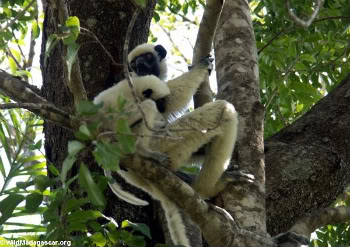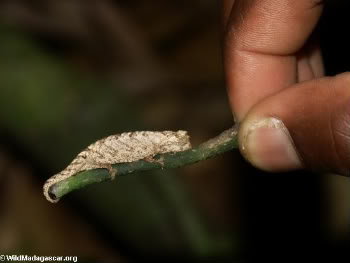|
|
Eleven conservation organizations—including WWF, CI, and WCS—have banded together to condemn logging in Madagascar’s world renowned parks during a time of political crisis.
Taking advantage of the turmoil after interim president Andry Rajoelina took control of the country in a bloodless coup from former president Marc Ravalomanana on March 17th, pristine forests have been plundered for valuable wood, wildlife trafficking has increased, and illegal mining operations have begun say the conservation organizations.
 Decken’s Sifaka lemur with infant, a close relation to the Critically Endangered Silky Sifaka which is threatened by logging in Marojejy, since those forests are its last habitat. Photo by: Rhett A. Butler. |
As reported last week by Mongabay.com, the forces involved in the logging are not just impoverished locals, but according to a local source who spoke on the condition of anonymity, ‘foreign traders’ and ‘big businessmen’.
“[They] have arrived in local towns seeking to take advantage of the political crisis that has weakened park protection and enforcement,” the source said. “This is the worst, by far, that has happened to [Marojejy] park in recent years. The situation is worse than desperate.”
The lawlessness of the situation is confirmed by the conservation organizations who write that the logging is done with “open and organized plundering, sometimes using firearms, of precious wood from several natural forests, including national parks such as Marojejy and Masoala.”
The chaos has put a halt to Madagascar’s tourism industry—one of the impoverished nations most important growth industries. Valued at $400-million-dollars-a-year the industry could be hurt for years to come, especially if its natural treasures are devastated.
As originally reported by Andy Revkin of the New York Times and Sobika.com, an online news source for Madagascar, the statement from the environmental organizations reads:
-
The Trees Must Not Hide the Forest: the Loss of Malagasy Heritage
During the last 20 years, Madagascar has undertaken significant and exemplary efforts to stop environmental degradation, effectively manage natural resources and preserve its unique biodiversity in the pursuit of sustainable development.
Beyond their inherent value, these natural riches –- which are a source of national pride -– also guarantee the benefits and services that are essential to the daily lives of the rural majority of the population, providing them among other things with water, food and energy. These natural resources also guarantee the development of the agriculture, fisheries and tourism sectors.
 Madagascar is home to the world’s most diverse chameleons, including this tiny Brookesia peyrierasi chameleon on twig. Photo credit: Rhett A. Butler. |
We, nongovernmental organizations working to conserve these natural resources for the long term well being of local communities, hereby express our deep concern at the current devastation occurring to the country’s natural resources:
– Open and organized plundering, sometimes using firearms, of precious wood from several natural forests, including national parks such as Marojejy and Masoala, which have been declared World Heritage Sites.
– Intensified smuggling of wild species, especially reptiles such as tortoises, to the national and international markets.
– Proliferation, due to the current impunity, of destructive practices such as illegal mining and slash-and-burn agriculture within protected areas and environmentally sensitive areas.
These deplorable acts will only further impoverish the country and deprive future generations of the Malagasy people from their unique natural heritage.
This situation once again compromises the efforts that have been achieved up until now to help local communities to preserve their resources from individuals attempting to plunder the national heritage for their own short term benefits.
We hereby call upon the competent authorities and all Malagasy citizens to urgently take action to stop and punish such acts so that natural resources are no longer held hostage to political crises and post-cyclone emergencies.
Through this appeal, we confirm our commitment to work for the biodiversity of Madagascar and for the well-being of the local communities, who are the stewards of this natural heritage. We invite each citizen to recognize that the sustainability of the development of the country depends upon its natural resources and we call on every individual to take responsibility.
Antananarivo, March 27, 2009
World Wide Fund for Nature, Madagascar et Océan Indien Occidental; Conservation International, Madagascar et les Îles de l’Océan Indien; Wildlife Conservation Society, Madagascar; Missouri Botanical Garden; Durrell Wildlife Conservation Trust; Institute for the Conservation of Tropical Environment; The Peregrine Fund;
ONG Fanamby; Madagascar Fauna Group; L’Homme et l’Environnement; Plant Resources for Tropical Africa
Related articles
Scramble to log Madagascar’s valuable rainforest trees in midst of crisis
(03/23/2009)
Armed gangs are logging rosewood and other valuable hardwoods from Marojejy and Masoala parks in Madagascar following abandonment of posts by rangers in the midst of the island nation’s political crisis, reports marojejy.com and local sources.
Political turmoil in Madagascar threatens lemurs, parks
(03/19/2009)
Political turmoil in Madagascar has wrecked the country’s emerging ecotourism industry and is now threatening to undo decades of conservation work. Conservation in Madagascar is highly dependent on income from tourism. Half of park entrance fees are returned to communities living in and around protected areas. Without this source of income, locals in some areas may turn to conservation areas for timber, fuelwood, agricultural land, and wildlife as food and for export.
Political violence in Madagascar may lead Daewoo to abandon controversial farm project
(02/10/2009)
Political instability and low commodity prices may lead South Korea’s Daewoo Logistics to delay or pull out of a controversial agricultural project in Madagascar, reports Reuters.
An interview with ringtailed lemur expert Alison Jolly
(10/06/2008)
Madagascar has more than 100 types of lemurs, but the most famous species is the ringtailed lemur, a primate found widely in the southern part of the Indian Ocean island. The world’s leading expert on ringtailed lemurs is Alison Jolly, presently a Visiting Scientist at the University of Sussex in the UK. Since arriving on the Indian Ocean island in 1963, Jolly has documented the behavior and population dynamics of ringtailed lemurs in Berenty, a small private reserve of gallery forest amid a sea of desert-like spiny forest in southern Madagascar.